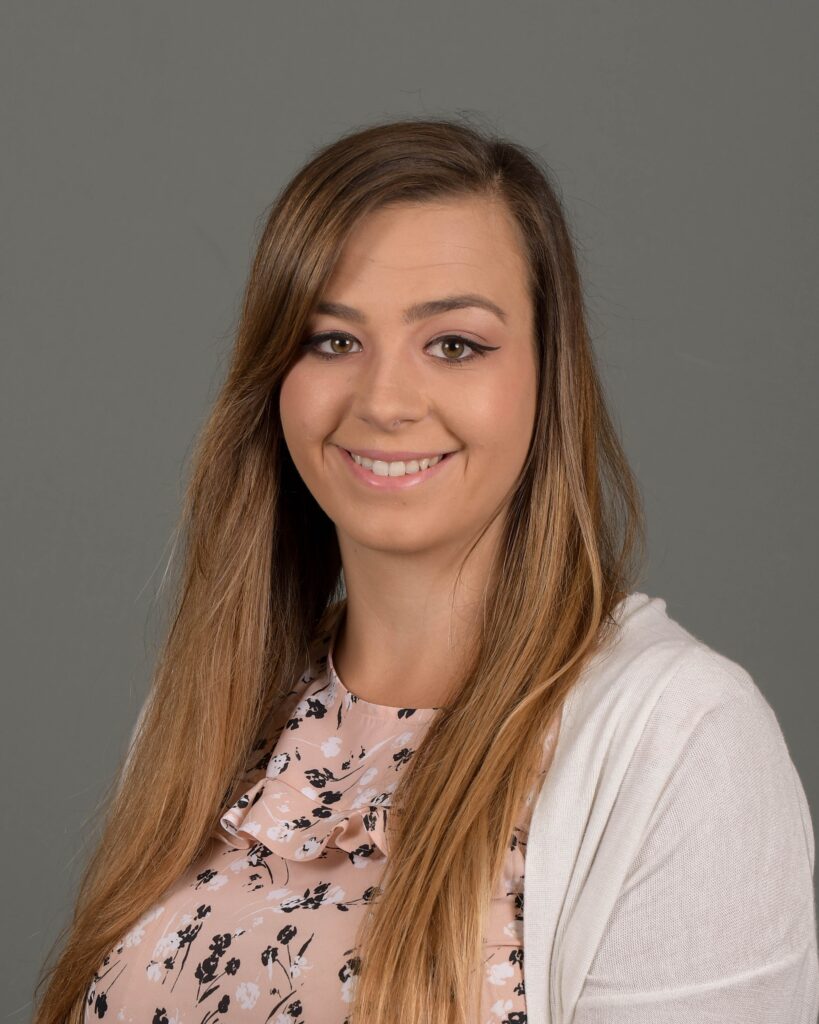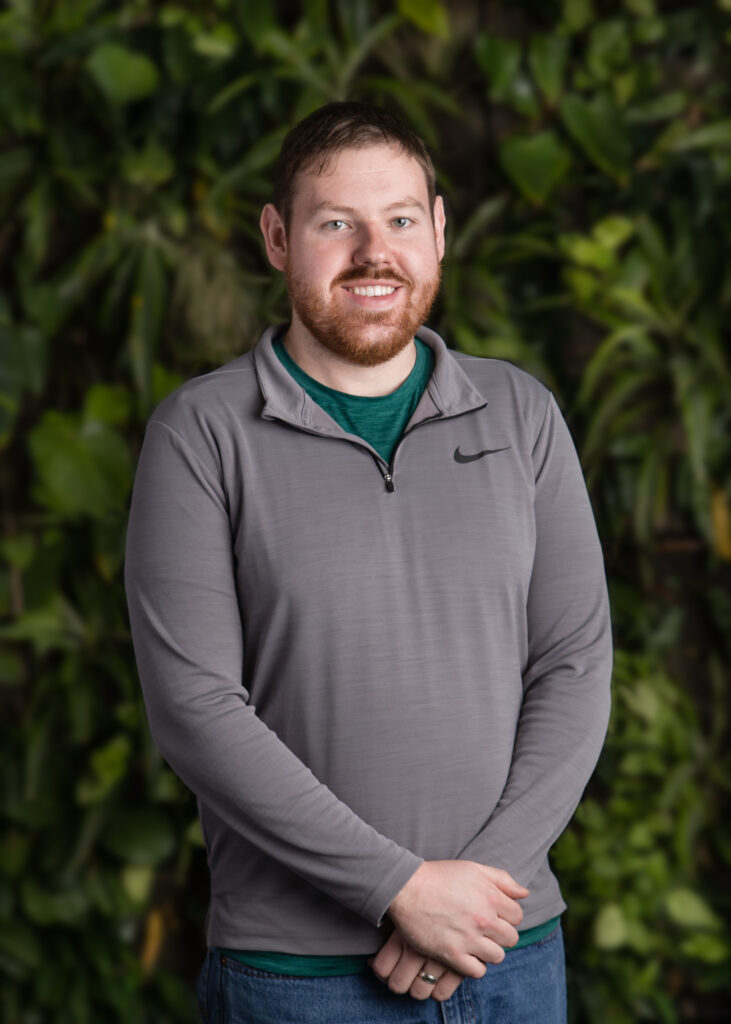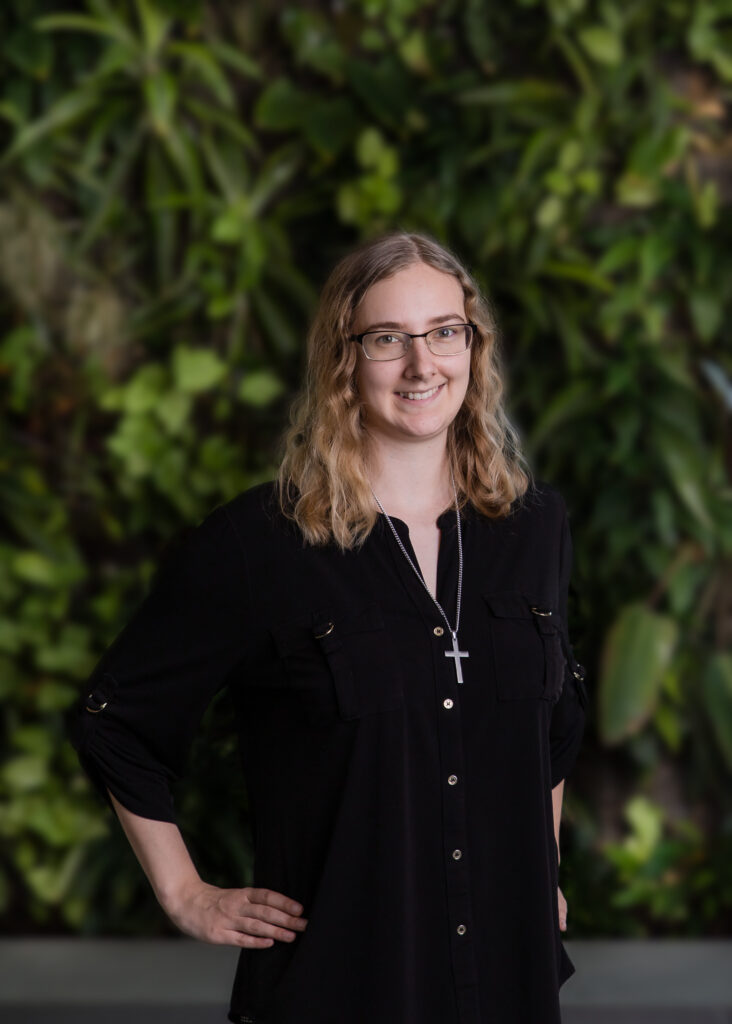
The Biotechnology Youth Apprenticeship Program hosted by the BTC Institute gives high school students an opportunity to gain hands-on experience in a research lab. Students can work as paid apprentices for either one or two years while also attending weekly training sessions at the BioPharmaceutical Technology Center. Through this program, students can graduate high school with robust knowledge of lab safety and fundamental techniques, as well as a strong understanding of the soft skills required to succeed in science, from reading peer-reviewed literature to delivering a research presentation.
Many of these students will grow up to pursue careers in science, from academic research labs to the biotechnology industry. Some of them have returned to Fitchburg to work at Promega, the primary corporate sponsor of BTC Institute. As these scientists progress in their careers, the skills they developed in the Youth Apprenticeship Program continue to support their work every day.

Emily Torio: A Full Circle Journey

“I talked to my parents and we made the decision together – the benefits were so strong that when they moved to Minnesota, I stayed in Wisconsin to join the apprenticeship program.”
Emily Torio knew she wanted to pursue a career in scientific research, so after completing a Biotechnology course offered at Oregon High School by BTC Institute instructor Peter Kritsch, the Youth Apprenticeship Program was the logical next step. However, her family was slated to move from Wisconsin to Minnesota before her junior year. Following some long discussions with her parents, Emily stayed behind to finish high school and work in the Youth Apprenticeship Program.
“I would go to high school in the morning, leave after fourth period around 11:30, eat a quick lunch, then drive to the university and work from 12 to 5,” Emily recalls. “After work I would drive go to my apartment to make dinner and do my homework.”
Emily worked as a youth apprentice in a biochemistry lab run by Dr. Brian Fox at the University of Wisconsin-Madison. The lab focused on developing methods for high-throughput solution of protein structures. Emily quickly became an expert in protein purification and gained experience in preparing samples for analysis by NMR and x-ray crystallography.
“I learned to find sequences using the BLAST database, make a plasmid, and clone it into cells to produce and purify a protein,” Emily says. “I got my hands on the entire pipeline from identifying to purifying a protein of interest.”
After two invaluable years in the lab as a youth apprentice, Emily was excited to continue working there when she enrolled as a freshman at UW-Madison. Unfortunately, the lab’s primary grant was not renewed, and it soon closed. Looking for a new opportunity to continue in research, Emily connected with Chad Zimprich, one of her former instructors from the Youth Apprenticeship Program who also happened to work at Promega. He recommended that she apply for an open internship in the Advanced Technology Group in R&D. She got the position, and Emily started working at Promega in the summer after her freshman year.
“The apprenticeship gave me such a leg up in those early days,” she says. “As a freshman in college, I was able to come to Promega with experience working with DNA, proteins, and even cell culture. Beyond that, I knew how to keep a lab notebook, and how to evaluate primary research sources for a paper.”
Emily returned to Promega as an intern after each summer during her undergraduate studies, and following graduation she was offered a full-time position. After settling into the routine of full-time employment, Emily connected with Aidan Holmes, the Associate Education Director at BTC Institute (and former Youth Apprentice), about volunteering with the program. It started as a bit of guest speaking, sharing her experiences in industry research, but when a position opened up, Emily stepped in as the primary instructor for all second-year Youth Apprentices.
“I often joke that I’m a product of Promega myself – starting my journey at BTC Institute as a high schooler, and now working both at Promega and BTC Institute,” she laughs.
Emily says that her experiences as a youth apprentice support her as both a researcher and instructor. In the lab, she’s become the go-to protein purifier for her group. In the classroom, she can help students process the highs and lows of working in research.
“Having that experience myself helps me give them advice to have the best experiences they can in their labs,” she says. “For example, I remember how boring it is to do dishes, but maybe we can discuss things to do to advance your skills or knowledge when you have down time. Could you be reading papers? Maybe someone is doing an experiment you’ve never done, and you could shadow them. These are extremely motivated kids and it’s so exciting to see how much they grow in the program.”
Lucas Slivicke: A Perfect Fit

“My time at that company had run its course, so I reached out to different people and one of my former instructors said there was an opening at Promega that would be perfect for me.”
Lucas Slivicke works as a Production Scientist in the Rosalind Franklin Center at Promega. Like Emily, he’s an expert in protein purification, though instead of using his skills in the research lab, he works in production at a wide range of scales. Unlike Emily, his route to Promega wasn’t a direct line.
“The networking has been huge,” Lucas says of the Youth Apprenticeship Program. “I was happy enough in my first job, but the lab manager from my old lab recruited me somewhere else. A couple jobs later, it was Chad Zimprich who brought me back to Promega.”
As a high school student, Lucas didn’t have a clear vision of his future. He earned his best grades in science, and he thought the Youth Apprenticeship Program would expose him to opportunities in biology and chemistry. He began working in the genetics lab led by Richard Vierstra lab at UW-Madison. At first, he was washing dishes and harvesting seeds from Arabidopsis plants. Soon, he was running DNA extractions and genotyping PCR.
According to Lucas, this experience helped him develop a confidence that is critical for building a career in science. In his early days, he was frequently seeking reassurance from his mentor. Even with a printed protocol in front of him, he needed to check with the more experienced scientist to ensure he was doing the right thing.
“These people are doing their own job, they can’t be answering those questions all the time,” Lucas says. “My mentor assured me that I knew what I was doing, and I should focus on getting it done. That still resonates with me today, because there’s such a difference between asking an important question to gain understanding versus asking a question I can already answer myself.”
Lucas worked in the Vierstra lab for two years and then returned for four summers while completing his undergraduate degree at the University of Wisconsin – River Falls. This gave him the opportunity to follow projects as they progressed, and eventually he was training newcomers to the lab including incoming Youth Apprentices.
The summer after Lucas graduated, the Vierstra lab moved to a new university. He took a job at a local biotech, but within months, his old lab manager recruited him to a new company. There, he got his first experiences with protein purification. Lucas thrived in this role, and when his assigned product lines were sold to a different company, he decided to follow them. He spent several years working in a small biotech company on a team of five people. Next time he was looking for change, he ended up at Promega on the Protein Purification team.
Looking back on the Youth Apprenticeship Program, Lucas points to one skill that has stuck with him over the 14 years since he first enrolled.
“I have almost never been held to the same high documentation standards that I had to meet in that classroom,” Lucas says. “The instructors were tough, but they effectively prepared us for working in a real lab.”
Kirsten Wingate: Safety First

“I don’t have a PhD or master’s degree, but the skills I developed in my previous lab are really the foundation of everything.”
Kirsten Wingate didn’t just learn to mix solutions and pipette in her Youth Apprenticeship. During their first ever conversation, UW-Madison Professor David O’Connor asked her if she’d ever heard of an emerging virus called “Zika.” For the next two years of high school, and then four summers through college, Kirsten worked in the O’Connor lab handling primate blood samples to study major infectious diseases.
“I worked in a BSL2 lab every day, and at the end I had the opportunity to work in BSL3,” she recalls. “There were times in those first years when I got in my head about whether I had an exposure, but nothing bad ever happened.”
Kirsten became quite adept at PCR and genotyping during her time in the O’Connor Lab, but the benefits of the experience extended past the bench. She learned to read journal articles, deliver presentations, and most importantly, speak like a scientist.
“Getting a lexicon of the scientific language is one of the most important things,” she says. “People can easily go over your head while explaining things. But you learn to identify the important words and break them down or connect them to things you already know.”
After finishing an undergraduate degree at the University of Wisconsin – Stout, Kirsten returned to the O’Connor lab but started to search for jobs outside of academia. She wanted more financial security than academia could offer, so she applied to several Madison-area biotechnology companies. One by one, she narrowed her focus to a job at Promega in the Protein and Nucleic Acid Group. She had used Maxwell instruments while working in the O’Connor lab, so she came to Promega with a general understanding of the technologies she would be working with.
A year and a half into her work at Promega, Kirsten is applying skills she developed in the Youth Apprenticeship Program while also looking toward the future.
“I know how to think academically, but I would like to better understand the thinking behind industry research,” she says. “We may know how to find the answer to a question, but does it make sense for the business? What do customers need right now, and how deep do I need to go to develop the tool they’re looking for? Understanding that perspective is my next step.”
To learn more about BTC Institute programs for K-12 students, click here.
